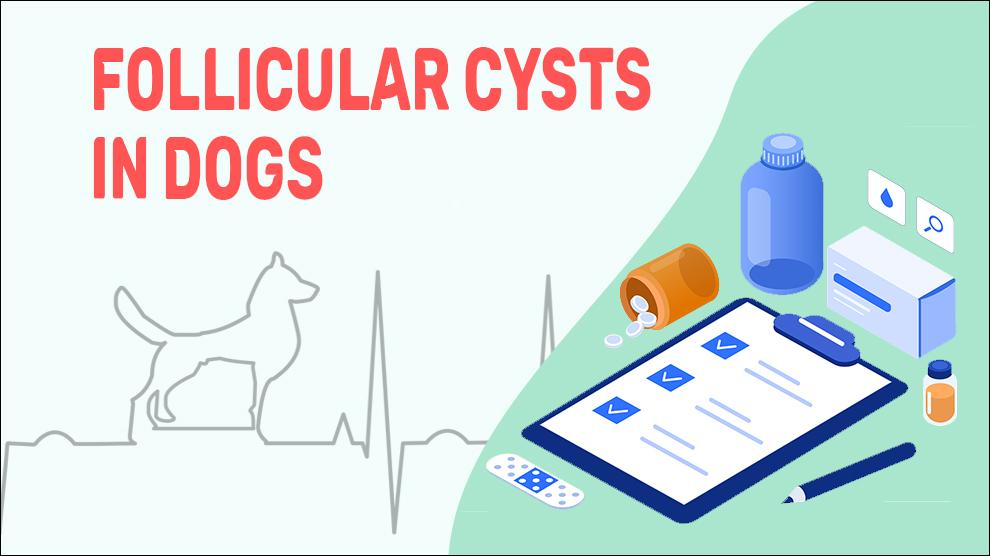What Is Follicular Cysts In Dogs?
Cysts are benign, sac-like, void spaces inside tissues that are filled with solid, semisolid, or gaseous material. A cyst has a distinctive membrane that is separated from nearby tissue and it doesn’t belong to the normal part of the tissue where it emerges. The capsular (exterior) part of a cyst is called the cyst wall.
The cystic filling may consist of natural bodily secretions (mucus, sweat, sebum, etc) or atypical metabolic products such as keratin, pus, or dead cells. When the cysts are infected and filled with pus, this will turn into an abscess.
There are different types of cysts, including true cysts, false cysts, follicular cysts, sebaceous cysts, and dermoid cysts.
Follicular cysts can be defined as enlarged hair follicles containing flesh-colored or dark-colored bumps that occur in the lining of hair follicles. Sometimes, they are outlined by stratified squamous epithelium as in the external (outer) root sheath of the hair. The infected follicular cysts are called pyoderma. These types of cysts are common in dogs and are also called epidermoid cysts.
Follicular cysts are similar to dilated comedones and pores (blackheads) but the latter has wider openings on the skin surface than the follicular cysts. They usually occur on the eyes, ears, or neck, but can emerge anywhere. They may ooze a thick yellow, brownish, bluish, or white material and when they grow in size, they may become painful or itchy.
Typically Follicular cysts are small, occasionally some may become large enough to cause pain, distension, or discomfort, then drainage or removal of the cysts may be required.
Symptoms Of Follicular Cysts In Dogs
Treatment Options For Follicular Cysts In Dogs
Treatment is not necessary for most follicular cysts. However, rarely do cysts get large and cause discomfort or other symptoms, then they will be drained or surgically removed.
Surgery: When the cysts are large and symptomatic, smaller incisions will be made and the veterinarian will drain them.
Home Remedies For Follicular Cysts In Dogs
The best treatment for your pet will be based on what’s the cause of the cysts.
Avoiding ingestion or inhalation of allergens is often not practical, yet, strategies to combat allergens and environmental management may be attempted to prevent sources of allergens.
Supportive therapies can be done at home and can include topical medications, oral antihistamines, antibiotics, medicinal baths, and Topical lipid skin treatments.
Discuss with a veterinarian dermatologist for any home care specific to your dog’s situation.
Prevention Of Follicular Cysts In Dogs
Follicular Cyst's etiology is poorly understood. Specific causes are not yet known. However, Hereditary is, perhaps a factor in some breeds and it is better to evaluate the affected dogs before breeding or at least before getting a dog from a susceptible lineage and get the health checks done.
Affected Dog Breeds Of Follicular Cysts
Akita, Chow Chow, Cocker Spaniel, Doberman Pinscher, English Bulldog, English Springer Spaniel, German Shepherd, Newfoundland, Schipperke, Female Dogs
Additional Facts For Follicular Cysts In Dogs
1. Causes:
- Hereditary
- trauma or injury
- Insect bite reaction
- obstruction of a follicle opening (resembling a blocked pore in humans)
- Follicular inactivity/ Swollen hair follicle
- Allergic reaction
- Hormonal imbalance
- sebaceous adenitis (Lack of sebum secretion)
2. Types:
Follicular cysts are of two types in dogs:
Natural form:
- Genetic predilection is noticed in a few breeds.
- Akitas and Chow chows are overrepresented.
Drug-induced form:
- This type often resembles the congenital condition with some deviations, such as oral involvement, sudden onset, and early age.
- Drugs commonly concerned are antibiotics.
- Long-term treatment for dogs with chronic skin conditions like allergies also causes cysts.
- Doberman pinscher and Labrador retriever.
3. Mortality: There is no mortality documented because of follicular cysts.
4. Diagnosis:
- Routine hematology
- Surgical biopsy
- Histopathological examination of the skin
5. Prognosis:
The prognosis for follicular cysts is really good. As the existing condition is not life-threatening, no rigorous treatment is usually necessary. However, relapse is possible following medical treatment in affected dogs. Proper hygiene and home care are the best defenses against future recurrences.
When To See A Vet For Follicular Cysts In Dogs?
Contact your vet right away, if you notice any of the following:
- Swelling or redness around the area
- Pus or fluid discharge
- Hair loss around the bump
Food Suggestions For Follicular Cysts In Dogs
- Choose a wholesome food, minimally-processed, that is free of preservatives, chemicals, hormones, and other toxic additives. Keep away from butylated hydroxyanisole (BHA) and ethoxyquin.
- An allergen-free (hypoallergenic) balanced diet ( check for thickeners, coatings, flavors).
- Try an elimination diet after food sensitivity testing. Many prescribed medications for an autoimmune disease can cause GI and non-GI woes.
- Consider a diet with all essential nutrients and also provides plenty of antioxidants (combat free radicals).
- Consider a probiotic supplement.
Conclusion
Most follicular cysts are incidental and benign, they do not require treatment or monitoring over time. The Prognosis is also excellent. Monitor your dog for any unusual symptoms. Don’t delay in reporting any flare-ups of symptoms to your veterinarian.

















